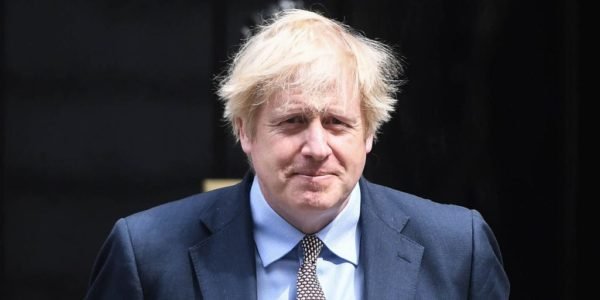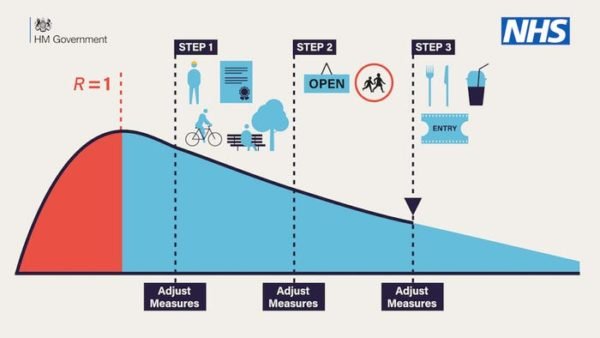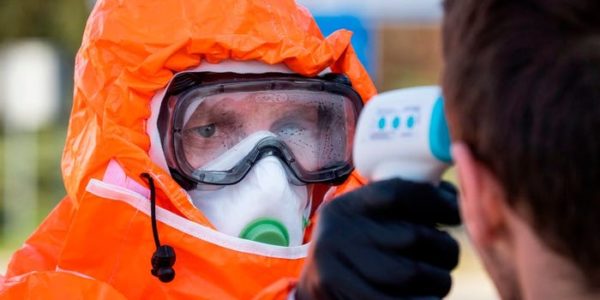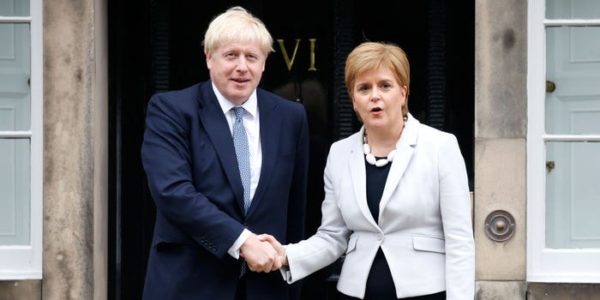
Boris Johnson has revealed his plan to bring the UK coronavirus lockdown to an end and get the country “back to work” over the next two months.
The UK prime minister used a televised address to the nation on Sunday to announce a phased end to current lockdown restrictions, but warned that each phase could be reversed if there are signs of a second spike in infections.
From Wednesday, individuals will be encouraged to return to work if they can do so safely, and cannot work at home.
Exercise restrictions will be ended from Wednesday this week, with non-contact sporting venues such as golf courses and tennis courts partially re-opened.
Schools and some shops will be gradually reopened from June, with parts of the hospitality sector re-opened from July, according to Downing Street officials.
The current restrictions on sunbathing and other activities outdoors will also be lifted, with individuals allowed to meet outdoors, providing they maintain a distance of two metres from each other.
Johnson said the loosening of restrictions was needed to counter the “colossal cost to our way of life,” caused by the lockdown.
“I want to provide tonight — for you — the shape of a plan to address [your] fears,” Johnson said.
“Both to beat the virus and provide the first sketch of a road map for reopening society.”
Under Johnson’s plan, there will be a gradual loosening of the restrictions starting from this week, with a new Joint Biosecurity Centre assessing when each phase can be safely completed.
The roadmap to ending the UK lockdown

- May 13: Public encouraged to go back to work if they can’t work from home.
- Restrictions on outdoors exercise will be lifted.
- Golf courses and tennis courses will be allowed to re-open.
- Individuals allowed to socialise at a distance outdoors.
- Construction industry encouraged to re-open.
- June 1: The phased re-opening of schools and shops will begin.
- July: Some leisure and hospitality premises with outdoor spaces will be allowed to re-open.
“From this Wednesday, we want to encourage people to take more and even unlimited amounts of outdoor exercise,” Johnson said.
“You can sit in the sun in your local park, you can drive to other destinations, you can even play sports but only with members of your own household.”
Most of the current workplace restrictions will remain. However, individuals unable to work remotely will be actively encouraged to return to work.
“We said that you should work from home if you can, and only go to work if you must,” Johnson said.
“We now need to stress that anyone who can’t work from home, for instance, those in construction or manufacturing, should be actively encouraged to go to work.”
Schools and shops to gradually re-open

From June 1 there will then be the gradual re-opening of schools in England, starting with primary school children in reception, year 1 and year 6, with the aim for all primary school children to return before the summer holiday.
The government also aims to allow at least some school days for secondary school children in year 10 and 12 at some point before the summer holidays.
However, other secondary school children will not return to school until September.
Decisions on school re-openings in Wales and Scotland will be taken by the devolved administrations.
If the virus continues to decline then plans to re-open some parts of the hospitality sector will then be brought in from July.
Restaurants and cafes with outdoor seating will be prioritised for re-opening.
However, Johnson warned that each phase could be delayed if there were signs of a second spike in infections.
“If we can’t do it by those dates, and if the alert level won’t allow it, we will simply wait and go on until we have got it right,” he said.
New coronavirus alert levels

From this week a newly-established Joint Biosecurity Centre will assess at which stage the UK outbreak is currently at and whether each phase of the lockdown exit strategy can be safely completed.
Under the strategy, the outbreak will be divided into different alert levels, with level five representing a critical crisis in which the NHS was overwhelmed and level one representing the eradication of the virus.
“Level One means the disease is no longer present in the UK and Level Five is the most critical – the kind of situation we could have had if the NHS had been overwhelmed,” Johnson said.
“Over the period of the lockdown we have been in Level Four, and it is thanks to your sacrifice we are now in a position to begin to move in steps to Level Three.”
He said the “Covid Alert Level.. will tell us how tough we have to be in our social distancing measures – the lower the level the fewer the measures.
“The higher the level, the tougher and stricter we will have to be.”
Quarantine imposed on people arriving by air
Johnson also announced plans to, at a future date, impose a two-week quarantine on people arriving in the country by air, in order to prevent new outbreaks.
“To prevent re-infection from abroad, I am serving notice that it will soon be the time – with transmission significantly lower – to impose quarantine on people coming into this country by air,” he said.
The prime minister did not explain whether the same restrictions would apply to those arriving in the UK by sea or train.
Johnson’s new message sparks criticism

Johnson’s decision to replace the government’s “stay at home” message with a “stay alert” message, was criticised by politicians from the devolved nations.
“The Sunday papers is the first I’ve seen of the PM’s new slogan,” Scotland’s First Minister Nicola Sturgeon tweeted earlier on Sunday.
“It is of course for him to decide what’s most appropriate for England, but given the critical point we are at in tackling the virus, #StayHomeSaveLives remains my clear message to Scotland at this stage.”
The Welsh government also confirmed that it would be retaining the previous “stay at home” messaging.
The statement was also greeted with skepticism by the government’s opponents.
“This statement raises more questions than it answers, and we see the prospect of England, Scotland, Wales and Northern Ireland pulling in different directions,” Labour Party leader Keir Starmer said.
“The Prime Minister appears to be effectively telling millions of people to go back to work without a clear plan for safety or clear guidance as to how to get there without using public transport.
He added: “What the country wanted tonight was clarity and consensus, but we haven’t got either of those.”
However, business leaders welcomed the announcement.
“Today marks the first glimmer of light for our faltering economy,” Dame Carolyn Fairbairn, CBI Director General, said.
“A phased and careful return to work is the only way to protect jobs and pay for future public services. The Prime Minister has set out the first steps for how this can happen.”
